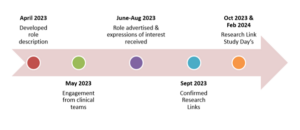Bridging the gap between clinical services and research: Implementing a trust-wide research link initiative
Nicola Manning @nicmanning2 Deputy Director of Research Nursing. University Hospitals Bristol & Weston NHS Foundation Trust and NIHR Nursing & Midwifery Senior Research Leader (SRL).
There is a growing body of evidence that patients treated in research active organisations have improved outcomes (Downing et al 2017, Jonker & Fisher 2018, Jonker et al 2019). There is also evidence that staff involved in research have greater job satisfaction with staff turnover often lower in research active trusts (Johnson 2018, Rees & Bracewell 2019). Therefore, encouraging a research-positive culture appears vital in both providing patients with access to clinical research and staff with the opportunity to support it (DHSC 2021).
The ‘releasing research potential’ theme of the Chief Nursing Officer for England’s strategic plan for research (NHS England 2021) focuses on developing ways for all nurses, to participate in research whilst supporting organisations to understand the benefits of research as an essential part of care. This theme inspired the development of a trust-wide research link initiative within our organisation, to bridge the gap between research and clinical services. Launched in October 2023, individuals were identified to act as champions for research in their clinical areas. The purpose of their role being to raise the profile of research, ensuring patients have the best opportunity to take part whilst also working with teams to embed research into clinical care.
Developing the role
Scoping activities were crucial in developing this initiative. We were acutely aware that obtaining engagement with a proposal that required commitment from clinical staff with no associated funding would be challenging. It was therefore imperative that the role was well planned and clearly defined with realistic expectations and benefits. To ensure this, a working group was formed, with their first task being to develop a role description. This provided a tangible document to use as a basis for framing discussions with leaders across the organisation.
Discussions with the trust’s infection control, tissue viability and falls teams were then undertaken to ensure the research role aligned with other link roles across the organisation, particularly in relation to support, commitment and resources. We considered this an important step to ensure the research link role would be viewed equally with other link roles in the organisation.
To promote the role and encourage staff to express an interest, engagement activities took place with senior nursing teams across the organisation followed by advertising and promotion of the role in clinical areas. The engagement work created a lot of interest and the first cohort of research links commenced their training in October 2023, with 88 Research Links now active across the organisation.
Figure 1 Timeline of research link initiative development
The research links programme
A key benefit of the research link role is access to the research links training programme. The programme empowers staff to explore research and evidence-based practice and how they can utilise this to create a positive research culture in their areas.
All research links enrolled on the programme receive:
• A research links badge and manual
• Research awareness training (in person or online)
• Introductory training to the research link role and responsibilities
• Annual in person study day
• Two-monthly webinars covering different topic areas
• Individual clinical area visits from the research training team
• Support from research delivery teams in their specialty
Figure 2 Research link badge
Increasing the Visibility of Research
To embed research in health and care, staff need to be able to understand, undertake and use research, and share this as part of a pro-research culture (NHS England 2023). Research Links are well placed to implement initiatives that increase the visibility of research across the organisation. Many links have been piloting ideas in their individual areas. Examples include creating departmental research strategies, adding research to team meeting agendas or introducing research objectives into team members appraisals.
In addition, this year, UHBW research links have all been tasked with creating research boards in their clinical areas, an action taken away from an annual study day workshop. The links were enthusiastic and keen to implement this in their clinical areas. We will be following progress with research links individually and showcasing research boards at the next annual study day.
Challenges
Maintaining engagement with research links undertaking the role whilst working under immense clinical pressures and enabling managers to support and see the value of the role has proved challenging. To aid this, we developed a managers Frequently Asked Questions (FAQs) document to support conversations between research links and managers about the value of the role. The FAQs covered practical information about supporting the role and emphasised the benefits of the role in relation to staff recruitment, retention and CQC inspection readiness. This will be an area of continued focus for the UHBW research training team going forward.
The Future
A 12-month evaluation of the role is in progress with early results indicating that undertaking the research link role has increased individuals self-reported research knowledge and confidence.
The UHBW research link initiative could be replicated in other organisations and prove valuable in developing staff. The UHBW research training team are currently compiling their resources and experience to create a package that other organisations could use to support implementation of the research link scheme. If you would like to find out more about this, please get in touch with us at researchtraining@uhbw.nhs.uk
References
Dept of Health and Social Care (DHSC) (2021)Saving and Improving Lives: The Future of UK Clinical Research Delivery. Available at: The Future of UK Clinical Research Delivery – GOV.UK (Accessed 28th February 2025)
Downing, A et al. (2017). High hospital research participation and improved colorectal cancer survival outcomes: a population-based study. Gut 66(1). Available at: High hospital research participation and improved colorectal cancer survival outcomes: a population-based study – PubMed (Accessed 28th February 2025).
Johnson, M (2018). Strengthening Research in the NHS. BMJ 2018;360. Available at: Strengthening research in the NHS | The BMJ (Accessed 28th February 2025).
Jonker, L & Fisher, S (2018). The correlation between National Health Service trusts’ clinical trial activity and both mortality rates and care quality commission ratings: a retrospective cross-sectional study. Public Health. 2018 Apr;157:1-6. Available at: The correlation between National Health Service trusts’ clinical trial activity and both mortality rates and care quality commission ratings: a retrospective cross-sectional study – PubMed (Accessed 28th February 2025).
Jonker, L et al. (2019). Patients admitted to more research‐active hospitals have more confidence in staff and are better informed about their condition and medication: Results from a retrospective cross‐sectional study. Journal of Evaluation in Clinical Practice 26(1). Available at: Journal of Evaluation in Clinical Practice | Health Services Research | Wiley Online Library (Accessed 28th February 2025).
NHS England (2021). Making research matter: Chief Nursing Officer for England’s strategic plan for research. Available at: NHS England » Making research matter: Chief Nursing Officer for England’s strategic plan for research (Accessed 28th February 2025).
NHS England (2023). Maximising the Benefits of Research: Guidance for Integrated Care Systems. Available at: NHS England » Maximising the benefits of research: Guidance for integrated care systems (Accessed 28th February 2025).
Rees, M & Bracewell, M (2019). Academic factors in medical recruitment: evidence to support improvements in medical recruitment and retention by improving the academic content in medical posts. Postgraduate Medical Journal 95(1124). Available at: Academic factors in medical recruitment: evidence to support improvements in medical recruitment and retention by improving the academic content in medical posts | Postgraduate Medical Journal | Oxford Academic (Accessed 28th February 2025).


